UC Berkeley Web Feature
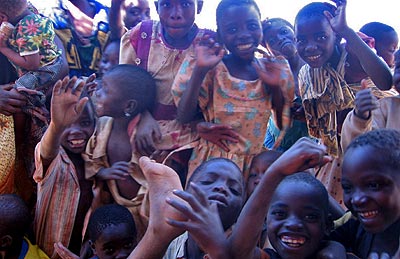 |
The
village children were very excited by my digital
camera. They
stared at me for 30 minutes until someone
told me they were waiting for me to take more
pictures. (Photos by Jennifer Browning except where noted) |
Making friends, learning about HIV/AIDS attitudes, and finding beauty in a remote Malawian village
| About Student Journal 2006 [an error occurred while processing this directive] |
MALAWI — People here say the main takeaway experience from the field is the sensation of bouncing up and down in a minibus on a dirt road for two hours.
Travel time is long in Mchinji, because the villages in our sample are far from where we are staying. There is no major town near our sample villages, and camping when running a large research project was found to be impractical in 2004. So, we have to leave early in the morning, usually before 7 a.m., in order to get a full day in the field. For those of us whose experiences with dirt roads have been limited to the hay ride at the pumpkin patch, the unevenness and jostling is a shock in the morning, but barely noticeable by the end of the day.
The villages are very far away, but distance is relative, having mainly to do with being accessible only by dirt road. The drivers work hard, constantly weaving in search of the smoothest part of the road and slowing down frequently to dodge a chicken or a herd of cattle. I had to experience travel this way to really grasp what a difference paved roads make. It is true that the gains would not be evenly shared by all people in these areas, but I believe it would have a considerable effect on these villages, which are so far from resources. However, I do not know what maintaining such roads would cost, particularly during the rainy season.
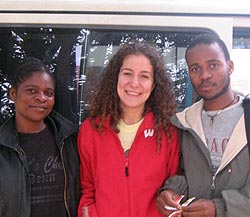 Me with supervisors Grace and Joel in front of the minibus. |
|
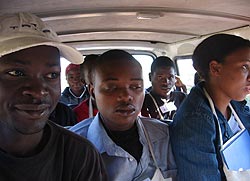 Here we are squeezed in the minibus on the way to the field. The women are wearing head wraps, which are quite common. |
|
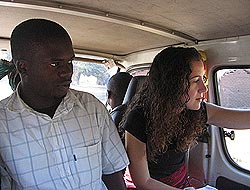 Here we are squeezed in the minibus on the way to the field. I am trying to hold on and keep all of the questionnaires from falling out of my lap! |
|
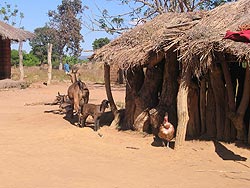 There are goats everywhere and they can be quite pesky when they get into the maize flour! |
|
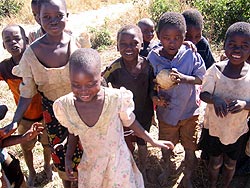 The boy in the blue shirt has a ball made out of string and plastic bags — very creative. |
|
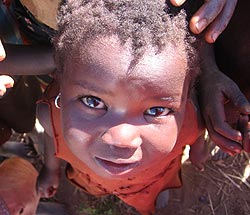 I took an individual picture of this girl when I discovered how excited the kids were to see their photo. However, it was hard to keep everyone else out. Notice all the hands! |
Every day, after an hour or so on the dirt road, we arrive at Mkanda Trading Center, a very small town, where we pick up the interviewers. The actual fieldwork is run by a team of supervisors, all Malawians, who are based with us at Kayesa Inn. They direct 50 or so interviewers who read the questionnaires to the villagers in our sample. There are three rounds to the research: a household-listings questionnaire, which documents basic information on everyone in the household; a main survey that asks questions ranging from AIDS knowledge to sexual history to religion; and finally a VCT [voluntary counseling and testing] component that will administer AIDS tests. The grad students on the project and I are mostly present in the field to check questionnaires and help out if there are any problems.
Before my first trip to the field, I had been told that I should wear a chitenje so as not to offend any villagers. A chitenje is a piece of printed fabric that you wrap around your waist and make into a skirt. In Mchinji, I have only seen one woman in pants and that was in the largest town near where we are staying. When we reached Mkanda, I jumped out of the van and attempted to put on my newly purchased chitenje around my pants. Grace, the only female supervisor, laughingly helped me, and I noticed that she put one on even though she was wearing a skirt, granted a more western one.
As soon as we were properly attired, all the interviewers poured into the van. We resembled the crowded commercial minibuses I had seen on the road from the airport. The arrival of our minibus in the village was a big deal. The children all gathered around the car as we squeezed out. I was greeted by cries of azungu, which means "white people." In the villages, the children will sit and stare at you for hours as you check questionnaires.
I brought out my digital camera to take pictures of the village. The children followed me, and I took a photo and showed it to them. There were screams of delight as they recognized their faces. I speak hardly any Chichewa, but I understood that they were asking me to take more. I started to take them individually and show them the pictures, thinking they would tire eventually of the game.
Not so. After a half an hour, I was looking for a way out so I pulled out one of the balloons I had brought to give away at Sam Mchombo's suggestion. I was busily involved puffing, almost collapsing in my attempt to blow one up when the driver started laughing. I asked him what was so funny, assuming he would comment on my bright red face. Instead, he translated a conversation between two of the children. One had said, "That mzungu is blowing up a condom," and the older more worldly child explained, "No it is a balloon, not a condom." I felt my face become a couple shades redder, and I hastily repeated, "No, balloon, balloon!" With that, I learned that children are definitely aware of HIV prevention methods.
My embarrassed reaction was very American. People in Malawi do not seem to have the same discomfort when discussing sex and contraceptives as in the States. We have diarists who write journals throughout the year where they record any conversation they have or overhear about AIDS. There are many conversations on the minibus about sex, and in one I read, people judged that condom use was increasing because they were finding more used condoms in the bush.
So the situation is not at all that Malawi is filled with misinformed villagers who have never heard of AIDS prevention strategies. In the surveys that I have been checking, people consistently show that they know exactly how AIDS is transmitted. They just do not know how difficult it is to transmit. (In my class at Berkeley on AIDS, I learned the surprising figure that having unprotected sex with someone who has HIV/AIDS gives a 1/1,000 chance of infection.) In 2004 when they did testing in Malawi, they discovered that people were overestimating the prevalence of AIDS. The rural areas in our sample had a prevalence of about 8 percent, which is lower than the national average of 14 percent.
After showing the children a game with the balloon and letting them run off to play, I decided to walk around the village and absorb my surroundings. I couldn't help but be reminded of a saying that one of my professors continually repeats, "We speak from a place on the map." She went on to suggest that the World Bank and other development organizations might look very different if they were headquartered in developing countries. I am starting to grasp what she means. Living here, even as I lead a very privileged life at the Kayesa Inn, I am much more aware of certain things, of constraints and difficulties that never occur to me in the United States. The power is out right now as I type this. Recently this has been happening every two days. Electricity is a luxury. There is none in the village.
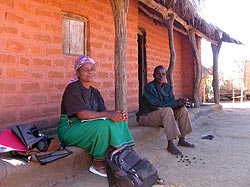 Grace (in her chitenje) and the village chief outside his house, which is quite simple. |
|
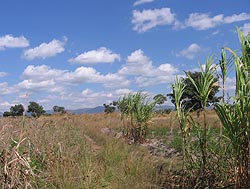 When I need a break from questionnaires, I always make sure I take a walk in the field around the villages. |
|
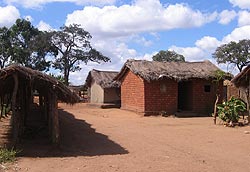 Guzani village: the structures on the left are used during the tobacco-leaf harvest. |
As I explored, I was struck by the village's beauty. I could not help but be moved by the huts sitting at the edge of yellow plains, colored by the golden grass and interrupted occasionally by dark green, graceful trees lining the hills all under a perfect blue sky and puffy clouds. But perhaps this is also my privilege to find beauty in the nature and so easily forget the poverty around me as I look away from the huts toward the hills. I was reminded of "A Small Place," a book by Jamaica Kincaid, where she discusses the privilege of the tourist who can travel to new places and find beauty and delight in other people's banality.
I would have to say that this is my true takeaway experience of the village: coming face to face with extreme poverty. Wandering around a village bears out the statistics that rank Malawi as one of the poorest countries in the world. People agree to answer long, highly personal surveys with us in exchange for a bar of soap or a bag of sugar. It is very difficult to explain to people who are not part of our sample why we are not interviewing them and giving them something. They want to know why we always come back to the same people.
When a couple asked Grace if they would be interviewed, she said tomorrow. I told Grace that I thought it was cruel that she had lied, and she agreed that in American English this would have been a lie, but that in Malawi, tomorrow is what you say when you do not want to give a negative answer to the question.
The first thing that struck me in the village were the dusty children all dressed in rags that appeared to be hand-me-downs from America. I saw a little boy in a Winnie the Pooh t-shirt. Imagine wearing a shirt every day of your life but not knowing what the words on it meant, or the significance of the story. The thought broke my heart, and I suddenly needed to try to explain the story to him, probably much more for my sake than for his own. But in my very broken Chichewa, I am not sure he understood much.
| Followup Remembering Malawi from afar: Delivering on Anna Key's promise to the Amai Achifundo Orphan Care Centre Malawi Nation, July 21, 2006 Berkeley's goodwill goalie: On a visit to impoverished Malawi, a Cal soccer player encounters 'the happiest people I ever met' Berkeleyan, Nov. 9, 2005 |
However, it would not be accurate for me to paint a picture of a poor, depressing, powerless "third-world" village. People may be poor, but they are also very generous. They let me sit on their porch in the shade to correct surveys. I loved how one veranda had been created by tree trunks supporting the overhanging thatch roof and stuck right into the slate-colored, concrete-textured floor. The women also pulled out a mat for me to sit on, and when the veranda no longer provided enough shade, I sat down with the women. They gave me peanuts that had been roasted over the fire. Freshly roasted, warm peanuts are incredible. Peanuts, or "groundnuts" as they are called in Africa, are a big crop here, and you can buy peanut-butter in any town. I said the few phrases I knew in Chichewa to the women and got some laughs.
Later, I told them a story about the hazing process on this project, with Grace translating. One of the grad students who had been in the Peace Corps in Malawi told a just-arrived student that the proper response to "Muli bwanji?" ("How are you?") was "Ndili mbuzi" ("I'm a goat"). She apparently repeated this for a week thinking people were laughing at her accent, until some kind soul took pity and explained what she had been saying. The women burst out laughing at this. I have since used the story again and again to break the ice and always get the same response.
I spent the rest of the afternoon checking questionnaires and sitting side by side with the women as they went about their work of preparing food and taking care of children. They told Grace when she returned that I was a strange visitor — "the visitor who did not talk."
I wish I knew more Chichewa, because I would have loved to have asked them many questions. I undoubtedly received different treatment because of my status as an azungu, but these women were so kind to a perfect stranger, giving her what they had and trying to make her comfortable. And in that — even more than in the village's physical surroundings — I find beauty.
